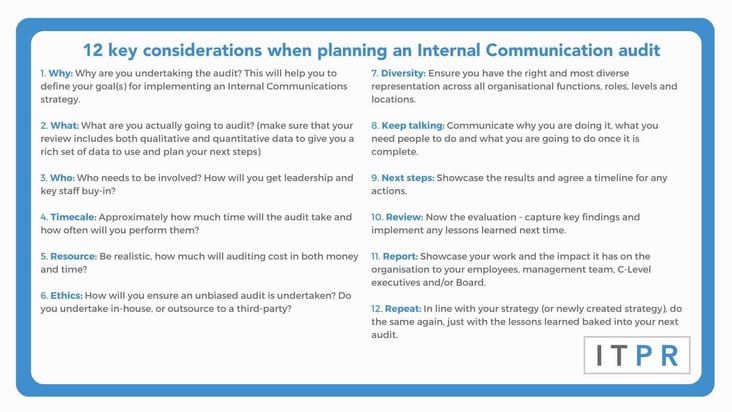Organisations invest significant time and effort in auditing their finances, analysing their supply chains and making sure stock levels are monitored to ensure that their budgets are accurate, and can be measured or predicted for the coming financial year.
Yet, few organisations apply the same logic to Internal Communication. This is just left to the Communications, or PR Team, Marketing, HR or even Policy teams to manage and measure the best way they see fit.
This is wrong and it’s about time Internal Communication started to get measured, evaluated and invested in as most other strategic business activity does.
But why? And if so, how and when should you audit your Internal Communication activity?
What is an Internal Communication audit and why is it important?
An audit evaluates the effectiveness (i.e. measurable impact) of your Internal Communication. This is mission critical, because without understanding what you are doing and what impact it is having, you won’t be able to understand what’s working and what needs to be improved.
Internal Communication audits help you set benchmarks for your Internal Communication efforts; understand whether the impact is changing employees for better, or for worse, and can also feed into the roadmap that informs the overall strategic direction of the organisation.
Conducting a robust Internal Communication audit is especially important for organisations with employees who have little face-to-face time with management, and don’t have regular access to computers, as well as for those organisations which have adopted remote, hybrid working models.
A successful Internal Communication audit enables you to demonstrate to the C-level executives the importance Internal Communication plays in accomplishment of the organisation’s strategic objectives.
Where do you start?
First and foremost, it is really important to have a handle on why you are undertaking the audit. Once you have the why, keep this at the forefront of your mind when doing everything else.
An Internal Communications audit should open the organisational bonnet and let you see if everything you do is aligned to your Internal Communication strategy. If there is an activity that isn’t adding value, or that isn’t aligned to this, you can question whether it is worth doing, or if it needs changing.
If you don’t have a strategy, it is a great stating point to help you create one.
Once you have your ‘why’, you’ll need to get commitment, or senior level buy-in to the audit to ensure a robust and effective Internal Communication audit is undertaken. To do this, you’ll need to invest resources such as time and money.
But before you spend too much time, or invest any money, here are 12 key considerations when planning an Internal Communication audit:

What should your audit include?
It is critical to have both qualitative and quantitative data to help you produce a clear picture of what is going on with your organisation’s Internal Communication.
Quantitative data in the form of survey data, such as X% of employees think Y, as well as statistics from an intranet or other digital communication tools, or perhaps the number of staff attending internal events.
Qualitative data in the form of workshop feedback, staff interviews, which could be from face to face meetings, or interactions with management, to exit interviews, as well as questions asked during team events. Qualitative data is essential, as it provides context behind the quantitative data.
When should you do it?
There is no time like the present! However, an audit can be undertaken at any time, especially if you have not done it before, if you want to get a fresh perspective on your Internal Communication activity, or if you are about to embark on a significant period of change.
Significant change can be:
- organisational growth - either organic, through a merger or acquisition
- or new ways of working being implemented
- new technology systems for employees to get on board with
- senior management changes
- new products or services being brought to market
Whatever the change, robust and empathetic Internal Communication is essential.
All of these instances require careful communication, planning and engagement to ensure that employees, at whichever stage of change they are at, are provided the information they need via the channel most appropriate to them. Crucially they must also be allowed to provide feedback on the change. When then should influence the correct course of action within C-Level executives.
An Internal Communications Audit is a starting point for change management
An Internal Communication audit will help to equip your organisation with the tools it needs to manage the change and to help your employees to ride the change curve, coming out more engaged than when they started.
A comprehensive Internal Communication audit will provide a complete breakdown of what channels are being used, their effectiveness, as well as their content and any gaps, as well as identifying possible routes of miscommunication.
This will allow you to identify what you are doing well, and where you can improve information sharing and feedback gathering.
Tags: internal communications




.png?width=60&name=twitter-logo%20(1).png)
